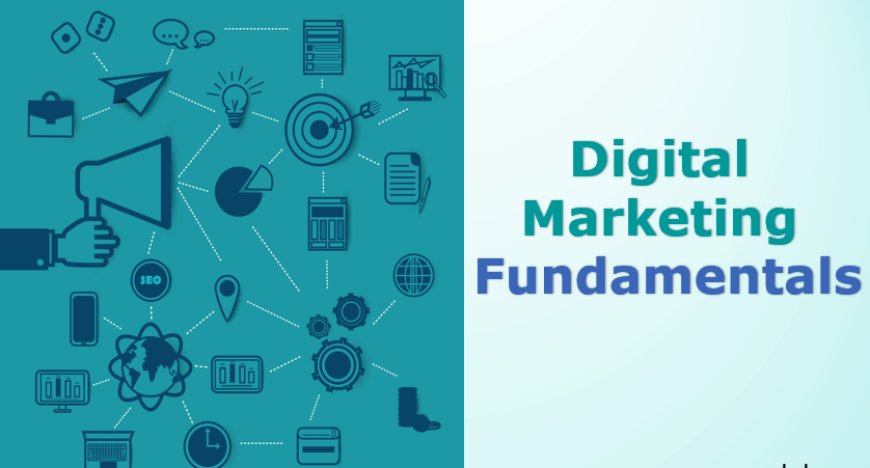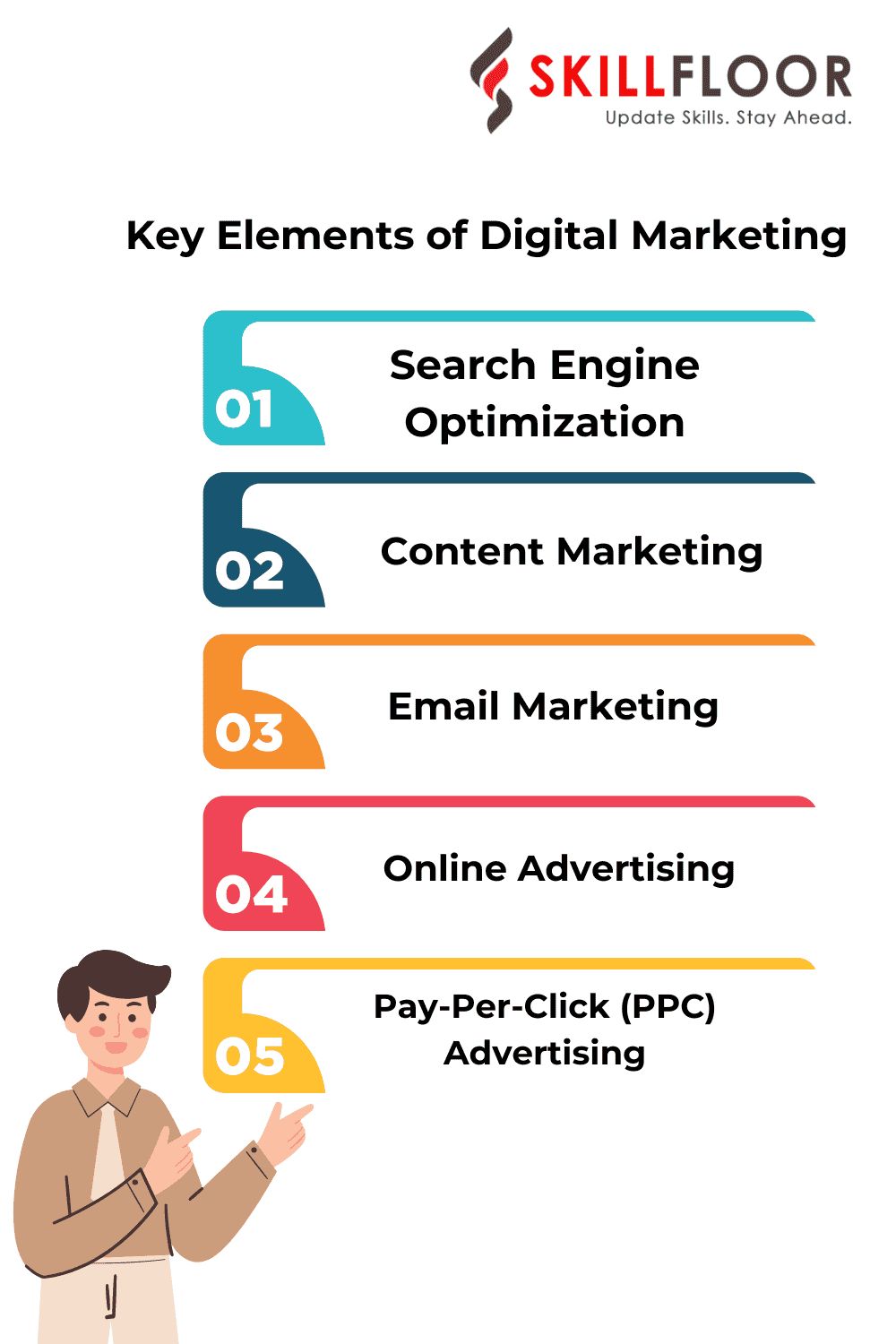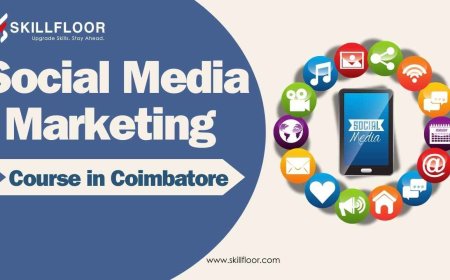Digital Marketing Fundamentals: A Comprehensive Guide
Discover the essentials of digital marketing in this comprehensive guide. Explore SEO, content marketing, social media, email campaigns, and PPC advertising for enduring and effective campaigns. Gain insights into the evolving digital landscape to thrive in the competitive market.

Digital marketing is crucial in the modern economic environment for establishing online connections between companies and their target markets. It is essential to modern strategies because it makes outreach and direct interaction possible. Brands may create lasting relationships with their customers and meaningful interactions with them through the digital sphere. Leveraging successful digital marketing techniques becomes essential for sustained success in a competitive market as firms adjust to the technological revolution.
Elements for Success in the Digital Age
Because of the digital ecosystem, businesses may now interact with their audience in ways never possible before. Digital technologies, such as the internet, have allowed brands to completely transform sales, advertising, and communication. Businesses need to understand digital marketing fundamentals to thrive in the modern digital world. It is an essential requirement for success in an environment where strategic marketing and efficient communication are critical.
Choosing Effective Strategies
Businesses may become overwhelmed by the abundance of digital marketing alternatives available to them, from social media and SEO to email campaigns and content. It becomes difficult to identify the best tactics for particular objectives in this varied environment. It takes careful planning to travel around these channels, taking into account the particular requirements and goals of any company. For an organization to have a successful and significant digital marketing presence, it must evaluate and implement methods that support its objectives.
What are the key elements of digital marketing, and how can businesses use them for effective and enduring campaigns?
Digital marketing's key elements include SEO for visibility, content marketing for engagement, social media for connection, email campaigns for direct communication, and PPC advertising for targeted reach. Businesses can integrate these elements strategically to create enduring campaigns that resonate with their audience and achieve long-term success.
Let's examine each type a little more closely.

Search Engine Optimization (SEO)
The core of digital marketing is the art and science of optimizing content for search engines. SEO involves enhancing a website's visibility in search engine results, making it more likely for users to find and visit the site. Keywords, quality content, and a user-friendly website are crucial elements in a successful SEO strategy.
Content Marketing
Content is king in the digital domain. Content marketing focuses on creating and distributing valuable, relevant, and consistent content to attract and retain a target audience. Blog posts, videos, infographics, and other content types can be powerful tools to build brand authority, engage audiences, and drive traffic.
Social Media Marketing
Social media platforms have become integral to digital marketing strategies. Leveraging platforms like Facebook, Instagram, Twitter, and LinkedIn allows businesses to connect with their audience, build brand awareness, and drive traffic. Engaging content, targeted advertising, and consistent interaction are key to successful social media marketing.
Email Marketing
Despite the rise of newer communication channels, email marketing remains a highly effective tool for businesses. Building and nurturing an email list enables direct communication with the audience. Email campaigns can include newsletters, promotions, and personalized content, fostering customer loyalty and driving conversions.
Pay-Per-Click (PPC) Advertising
PPC advertising allows businesses to display ads on search engines and other platforms, paying a fee only when the ad is clicked. This method offers a targeted approach, ensuring that businesses reach users actively interested in their products or services. Platforms like Google Ads and Bing Ads are popular choices for PPC campaigns.
Online Advertising
Where SEO was referred to as the inexpensive aspect of the fundamentals of digital marketing, online advertising is the paid aspect, also termed as paid media. When you search on Google, let’s say free courses with certificates, at the top of the search results, you would notice some links before which the word, Ad is mentioned. This is an example of online advertising. All those ads that pop up on your screen while you are scrolling through Facebook or Instagram are also examples of paid media.
There are many channels for online advertising like YouTube ads, Facebook ads, Linkedin ads, Instagram ads, Google ads, PPC Campaigns, etc. Brands have to identify what works best for them and which channel would be the best way to reach their target audience.
Online advertising is considered the best way to reach the target audience and increase brand awareness.
Mediums like Google and Facebook have provided many resources that help the brand build its ads and reach the targeted audience. Also, online advertising has offered brands the ability to keep track of and analyze their reach, which is not possible with traditional marketing.
Mobile Marketing
How many people possess a phone? Too many is the general answer.
Mobile marketing dominates the digital scenery. It focuses on reaching the target market using phones or smartphones. This can be achieved through social media, text messages, email, etc.
Mobile marketing involves everything that is done on the desktop and presenting it for the mobile. The websites that are designed should be mobile-friendly, and activities that can be considered unique to mobile marketing are in-app-built notifications, text messages, and social media activity to a certain extent.
Affiliate/Influencer Marketing
Affiliate marketing is getting the product promoted through another person and paying a commission to them on every sale made. It is using the reach of an individual to your advantage. Here, the affiliate needs not to be an individual alone but can be an entity.
The affiliate promotes the product, whether a good or service, through any medium like a YouTube video or a blog, and when anyone clicks on the link provided to them for the product, ultimately buying it, then they are compensated for it through commission.
Most of the companies have started collaborating with influencers to increase their brand awareness. Social media influencers have a great impact on the views of their fanbase, and brands are using this to their advantage by getting their products advertised through influencers. It benefits both parties as influencers who are working as affiliates get the commission as an incentive, and the brands get the sales.
Why is digital marketing important?
1. Global Reach: Digital marketing breaks down geographical barriers, allowing businesses to reach a global audience without significant investments in infrastructure.
2. Cost-Effective: Compared to traditional marketing, digital methods often offer more cost-effective solutions, especially for small businesses with limited budgets.
3. Measurable Results: Digital marketing provides analytics tools that enable businesses to track and measure the performance of campaigns in real time, allowing for quick adjustments for optimal results.
4. Targeted Advertising: Precise audience targeting ensures that marketing efforts are directed towards individuals likely to be interested in the product or service, increasing the chances of conversion.
5. Engagement Opportunities: Social media and content marketing create avenues for direct interaction with the audience, fostering brand loyalty and customer engagement.
6. Level Playing Field: Small businesses can compete on a more level playing field with larger corporations, as online visibility is not solely dependent on budget size.
7. Flexibility and Adaptability: Digital marketing allows for quick adjustments to strategies based on real-time data, ensuring adaptability to changing market trends and consumer behaviors.
8. Higher Conversion Rates: Targeted marketing, personalized content, and easy online transactions contribute to higher conversion rates compared to traditional methods.
9. Brand Development: Digital platforms offer diverse tools to build and strengthen brand identity, fostering a consistent and memorable brand image.
10. 24/7 Accessibility: Online presence provides continuous accessibility for consumers, allowing them to engage with products or services at any time, enhancing customer convenience.
Businesses negotiating the constantly shifting internet terrain will find it helpful to grasp the foundations of digital marketing. A thoughtful combination of these components, from targeted advertising and social media interaction to SEO and content marketing, guarantees long-lasting campaigns. Digital marketing is significant because of its capacity to generate meaningful engagement, measurable outcomes, cost-effectiveness, and global reach. Businesses that adhere to these principles in the digital age acquire a competitive advantage that promotes enduring relationships and long-term success.






























































